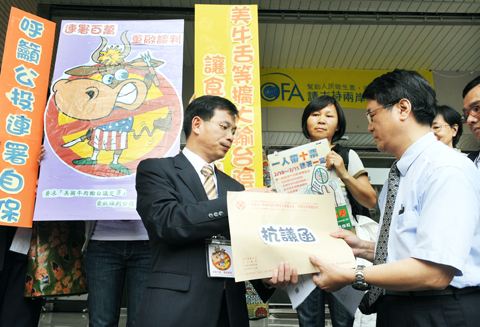|
Policy on US cow tongues comes under
fire
By Shelley Huang and Shih Hsiu-chuan
STAFF REPORTERS
Thursday, Apr 22, 2010, Page 3

Department of Health official Kao Tsung-hsien,
right, accepts a protest letter from Consumers’ Foundation chairman Hsieh
Tien-jen yesterday urging the government not to import US cow tongues and other
beef products that might be infected with bovine spongiform encephalopathy or
“mad cow disease.”
PHOTO: LO PEI-DER, TAIPEI TIMES
The Consumers’ Foundation yesterday went to the Department of Health (DOH) to
protest the government’s decision to allow imports of cow tongues and diaphragms
from the US, while the DOH denied that politics was involved in opening the
country to US beef and its policy backtrack in the past two days.
The foundation, which has been pushing for a referendum on the beef import
issue, said that cow tongues, diaphragms and other parts should be considered
internal organs and therefore prohibited from import.
On Monday, officials from the DOH, the Ministry of Economic Affairs and the
Council of Agriculture (COA) told a press conference that tongues, penises,
testes, tails, tendons and skirts (diaphragms) derived from cattle less than 30
months of age slaughtered on or after April 1 would be permitted to enter the
country because they are not internal organs and therefore meet the requirements
set by the Act Governing Food Sanitation (食品衛生管理法).
The Act, passed on Jan. 5, prohibits the import of US ground beef, beef offal
and other parts, such as the skull, eyes and intestines, contravening a
bilateral protocol signed by Taiwan and the US in October last year.
On Tuesday, however, officials held another press conference and advised
businesses to hold off on importing cow tongues, testes, tendons and skirts
because of consumer concern that these parts may expose them to the risk of
contracting bovine spongiform encephalopathy, also known as mad cow disease.
“The attempt to push cow tongues and diaphragms into the country was the US
government’s way of testing the waters to see how consumers would react,” said
Foundation chairman Hsieh Tien-jen (謝天仁), who said politics was behind the
decision.
“The US is pushing the boundaries on which parts can be imported to Taiwan.
Eventually, the entire cow will be allowed with no limitations on the cattle’s
age,” he said.
The foundation urged government officials to set clear prohibitive measures on
imports of any kind of meat that may pose health risks to the public, rather
than being indecisive and allowing imports while advising companies to refrain
from importing the products.
In the past few days, the foundation’s criticism of the DOH and other government
agencies has been joined by lawmakers, civic groups and academics alike, who
disapprove of the government’s on-again, off-again stance.
In response, the DOH denied that politics was involved or that it has
backtracked on its own policies by saying that it has maintained a consistent
position, which is that cow tongues, diaphragms and testicles are not internal
organs and are permitted to enter the country. However, in order to assuage
consumers’ concerns about the safety of the beef parts, the DOH “advised”
businesses to hold off on importing the beef parts until the issues can be
resolved.
Meanwhile, Premier Wu Den-yih (吳敦義) also denied that the government had
performed a U-turn on tongue imports.
In an interview with the CtiTV last night, Wu defended the Bureau of Foreign
Trade (BOFT).
“The BOFT did not do anything wrong, neither did the DOH — [the government] did
not sway back and forth. On the contrary, I thought [the DOH] did well to ensure
the public’s health,” Wu said.
Wu said that the BOFT made the decision in accordance with the conclusions of a
panel of experts on May 18 last year that cow tongues and the other 12 items
were classified as offal and not internal organs.
He did not elaborate on what prompted the BOFT to make the promulgation on April
1st since the entry ban on US bone-in beef and other beef products, including
cow tongue and other offal, has been lifted since the signing of the Taiwan-US
beef protocol last October.
“Now that consumers, academics and professors and National Taiwan University
zoology professors have expressed concerns over the safety of cow tongues, the
DOH did a good job in halting the imports,” Wu said.
|
![]()
![]()
![]()